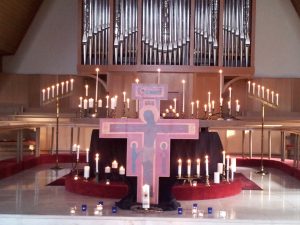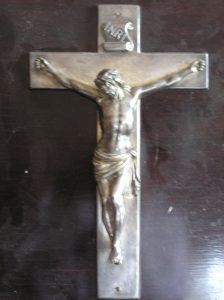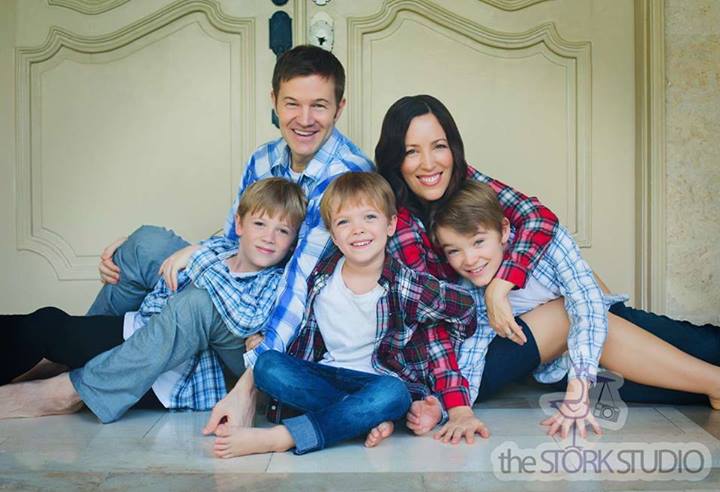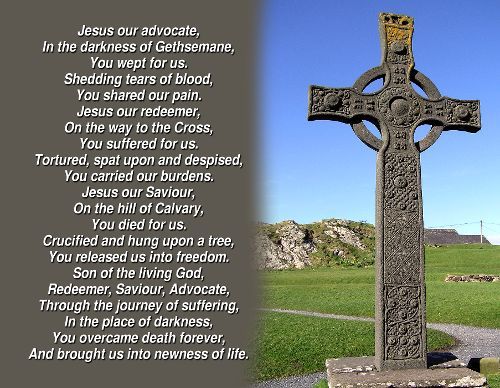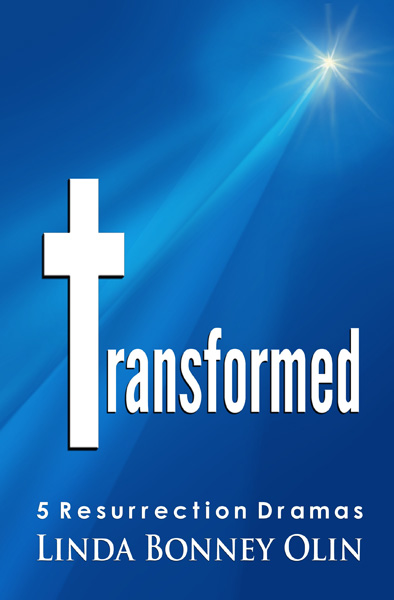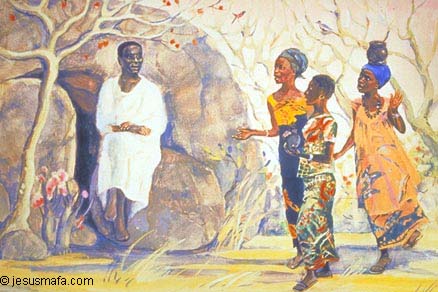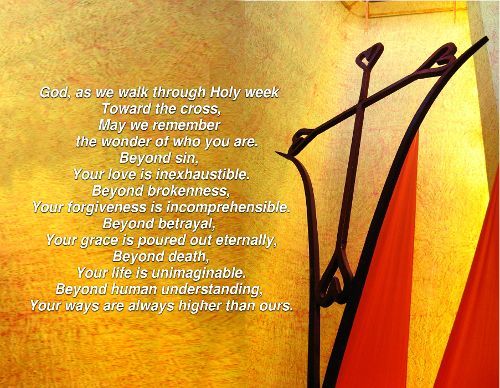Last night we attended the Good Friday Tenebrae service at our church. It was a very moving service of readings. We started with the sanctuary alive with light and ended with it in darkness except for the Christ candle which stood at the foot of the cross. It was powerful. Here are the readings that most impacted me.
It is in the darkness, when there is nothing left in us that can please or comfort our minds, when we seem to be useless and worthy of all contempt, when we seem to have failed, when we seem to be destroyed and devoured, it is then that the deep and secret selfishness that is too close to us for us to identify is stripped away from our souls. It is in this darkness that we find liberty. It is in this abandonment that we are made strong. This is the night which empties us and makes us pure. (Thomas Merton)
To each one of us Chris is saying: If you want your life and mission to be fruitful, like mine, do as I do. Be converted into a seed that lets itself be buried. Let yourself be killed. Do not be afraid. Those who shun suffering will remain alone. No one is more alone than the selfish. But if you give your life out of love for others, as I give mine for all, you will reap a great harvest. (Oscar Romero)
And out of my reflections came this poem:
Today we mourn.
For promises unfulfilled
for wholeness unrealized
for brokenness still afflicting.
Today there is only darkness.
Our hopes are buried
our longings shrouded
our desires entombed.
Today the grave engulfs us.
We walk in hell
empty, stripped of life
no light only darkness.
Today God seems to have failed.
Yet here we find freedom
Between death and resurrection
This is the night which empties us
and makes us whole.
This morning I sat at my desk lost in the agony of the cross. The agony of the cross is never far from us not just on this Friday but every day. We experience it in our own sufferings and of those we love. We watch it on TV in the agony of families who lost their children and their loved ones in Flight 370 and South Korean ferry disaster. We watch its ongoing unfolding in the horrors unfolding in Syria, the Ukraine and other parts of the world. Why? Why? Why? we cry and there are no easy answers.
I had just received a Facebook note from my good friend Michelle Ruetschle. You may remember several years ago when her husband Steve had an accident that left him as a quadriplegic and the amazingly miraculous recovery he made. He is now walking, and working once more as pastor in the Philippines. Now one of their sons has developed Type 1 diabetes. Michelle’s bravery in the midst of this new agony is a wonderful reminder to me of how all of can respond in the situations of life that make us feel, like Jesus that we are abandoned, persecuted and despised.
Michelle says:
My ten year old is already an expert, not only in his care but in his attitude. But as his mother, I count the cost and gather up the shards of freedom left in the aftermath of the disease. To do anything less would be to miss the courage and responsibility Jude exhibits daily.
A few brave friends looked our situation in the face, and with voices thick with tears, said, “Too much.” I was grateful for the absence of placation and appeasement, that allowed it to be a very bad thing that had happened to our son. We rise and smile so that it is not too much, especially for others, especially for him. But behind the capability and the making the most of things, this, like so many other things, is not the way it should be. Just as no child should hunger or thirst or suffer neglect, no child should be poked and prodded throughout their day. No child should worry about every bit of food that passes their lips. No child should be woken in the night to make sure they are not dangerously low. I should not know the ICU nurses so well. While we are going to be okay, and while Jude will be able to do many things in life, it is also all right to acknowledge that this is not, actually, okay.
Today is Good Friday. In Manila, the stores are closed, the city hushed, the traffic scarce. Last night, as we ended our Maundy Thursday service, the lights dimmed and Steve ripped the covering off of the altar and left it messy on the floor. He limped from the sanctuary. We processed out in darkness and silence. I am glad for a God that does not turn away from suffering. I am grateful that he wept in the garden on the night he was betrayed. I am grateful that he wanted friends to stay awake with him and pray. They did not. I am grateful that he still considered them friends.
It is sometimes considered a sick thing that as Christians we remember our Savior through blood and a broken body, that we gather to worship around a Roman torture instrument, the cross. But if I am honest about my own brokenness, and as I look out upon a world that suffers far more than I could ever know, I am grateful for the language of suffering that is so central to our faith. His sacrifice was costly. Today we turn and look that cost in the face: the beatings, the mockery, the crown of thorns, and yes, the Roman instrument of torture, the cross. We cannot weigh the spiritual suffering, the heaviness of our sin and shame, the separation from the Father, that drove the pain still deeper. But we can honor it by acknowledging it, by looking it in the face with whatever courage we can muster.
It is deeply troubling, as it should be. His suffering is troubling. Our sin is troubling. The suffering that abounds in the world is troubling. But as we shift our gaze from the suffering itself to the love that caused him to willingly hang there, it is also heartrendingly beautiful. We see him extending grace to an undeserving thief. We see him forgiving us even as we did the harmful deed. We suffer because we must. He suffered because he loved. The love has a transformative effect. The sweetness mingles with the bitter, just as love mingles with our sin, and shifts what is true. The cross becomes not only an instrument of torture but the instrument of our redemption. The curtain is forever torn asunder. We enter in.
It is already Good Friday in Australia, New Zealand and parts of Asia so I wanted to get these Good Friday prayers up early. May we all enter into this day with heaviness of heart for the high cost of redemption.
It is finished.
The procession begun in triumph
with shouts of acclamation.
Hosanna, Hosanna!
has ended
with cries of condemnation.
Crucify, crucify!
It is finished.
The king has become a slave,
power and wealth conquered
by the One who washes feet in love,
and dies the death of outcasts.
It is finished.
The transformation is complete,
and in this story lies my hope.
From death springs forth new life.
The seeds of Christ
buried in my heart
will see resurrection light.
It is finished.
Make of us your new creation Lord.
Nourish the soil,
raise us up transformed.
May we remember the ways you loved.
From death of self
Let us live to love and serve and share.
Let your life be multiplied in us
to become fruit for our hurting world.
The photo above is one of a series of prayer cards published for Lent and Easter.
About three o’clock Jesus cried with a loud voice, “Eli, Eli, lema sabachthani?” that is, “My God, my God, why have you forsaken me?” Matthew 27:46 (NRSV)
As I worked on a dramatic monologue and songs featuring Mary Magdalene, an image of Mary’s grief-stricken face haunted me. I heard her hollowly echoing Jesus’ words, over and over, during the long hours between his death and his resurrection: “My God, my God, why have you forsaken me?”
The Bible tells us that Jesus cast out seven demons from Mary Magdalene, so she was no stranger to torment. From those depths of misery, Jesus restored Mary to physical, spiritual, and emotional wholeness. And afterward? Jesus didn’t forgive her sins with a fleeting touch and move on down the road to the next waiting sinner. No, he deeply cherished her. Mary’s gratitude exploded into love. She devoted herself to Jesus and his ministry. As their relationship grew closer, she probably assumed she would bask in his constant presence forever.
Then came his crucifixion and death.
Mary’s anguish as she stood at the foot of the cross on Friday must have been blunted by a sense of unreality. These horrors couldn’t be happening, not to the Promised One! Somehow, Jesus would pull through and triumph! But after his lifeless body was taken down from the cross and entombed, there could be no denying the awful truth. Jesus was dead.
Other disciples were stunned by the loss of their hopes that Jesus would someday establish God’s promised kingdom. For Mary Magdalene, the loss was much more personal. The man whose touch had once made Mary whole … was gone. His absence left a terrible emptiness inside her, even more devastating than the brokenness he had healed in the first place.
Of course, we know that Mary was reunited with Jesus on Sunday. Their encounter in the garden near his empty tomb is one of the most thrilling, tender scenes described in the Bible. But she had no way of knowing this was going to happen until the moment it did. In the meantime, what an excruciatingly bleak Saturday she suffered through!
Have you ever experienced a crisis of faith in one of those bleak Saturday times? Wondered why the Lord plucked you, body and soul, out of the muck only to pull a vanishing act after you gave him your love? Looked with envy at Christians who seemed to have the cozy relationship with Jesus you craved but didn’t find? Despaired of ever being whole again, without Jesus’ manifest presence?
If so, you’re not alone. We all are easy prey to feelings of doubt and desertion when the Lord seems far away.
It’s human nature, after all, to desire closeness to someone we love. If we assume that all Christians experience an intimate communion with the Lord 24/7 and that idyllic state doesn’t happen for us, we may feel confused, even angry. When a beloved human person is unresponsive, it’s a pretty clear sign that the bloom is off the romantic rose. So, when Jesus doesn’t seem to answer our prayers, uncertainty creeps in and our own fidelity wavers. People we trusted with our love have dumped us before. Maybe, we tell ourselves, Jesus is no different.
But he is different. Jesus isn’t an ordinary human, and he doesn’t express love in an ordinary human fashion. His ways are God’s ways, and God’s ways are not ours. His plans for the benefit of his beloved—us!—sometimes take Jesus out of our sight, beyond the reach of our human understanding.
To carry out such plans, Jesus allowed death to separate him from Mary Magdalene and his other beloved followers and family. Though they didn’t realize it at the time, he had not forsaken them. Just the opposite! His departure made possible an everlasting union with him, for them and for all people, including us today. That’s undying love!
When we feel Jesus’ arms enfolding us and hear his voice in our hearts, let’s fully enjoy the moment. And when we find ourselves in a bleak Saturday time, let’s draw comfort and courage from the truth Mary Magdalene learned: Jesus doesn’t lead us on and leave us brokenhearted. He will love us forever! But sometimes he must go where we cannot follow, for a while, for our good and God’s glory.
Be strong! Stay faithful! Sunday is coming!
Bio
Linda Bonney Olin is a farm wife, artist, and writer of dramas, songs, poems, devotions, Bible study materials—whatever the Holy Spirit assigns. The Mary Magdalene monologue mentioned in this devotion appears in her recently released book Transformed: 5 Resurrection Dramas. Her other books on Amazon include Giving It Up for Lent: Bible Study, Drama, Discussion; The Sacrifice Support Group: A Dramatic Comedy for Lent; and Songs for the Lord. Visit her Faith Songs blog to contact Linda and find a variety of resources for ministry, music, and more. Link to Amazon’s Linda Bonney Olin page:
Christ is Risen: The world below lies desolate
Christ is Risen: The spirits of evil are fallen
Christ is Risen: The angels of God are rejoicing
Christ is Risen: The tombs of the dead are empty
Christ is Risen indeed from the dead,
the first of the sleepers,
Glory and power are his forever and ever
St. Hippolytus (AD 190-236)
Easter Prayers from Jon Birch at Faith and Worship
Easter resources from Textweek.com
The Easter Vigil explanation and service by Bosco Peters.
Easter Litany from re:worship.
A great collection of resurrection images here
And some music to reflect on:
First from Beneditcitnes of Mary: Easter at Ephesus.
Taize community:
Let nothing disturb you
Let nothing disturb you,
let nothing frighten you,
everything passes,
This is the last in a series of posts on resources for Holy week. Check out the other posts:
This is one of a series of prayer cards published for Lent and Easter. Check out the other cards here
On Sunday evening our family gathered around a small glass jar and mixed soil with ashes and buried wheat berries beneath the humus then doused the mixture with water and processed around the yard then through the corridors of our house singing a song about Jesus entering Jerusalem riding on a donkey, preparing himself to die so that we may live. With good care and a bit of luck, the seeds will sprout by Easter Sunday morning – a visible sign of the necessary death of the seeds to bring life. This was Palm Sunday, Holy Week – a season within the season of Lent to prepare us to celebrate the life that is to come on Easter.
Planting seeds is an act of faith that continues to bring wonder and joy to our children (and even to us adults when we pause to contemplate the wonderful miracle of death transforming to life.) I see other types of seeds planted all around me during this time of year. The Texas flora and fauna are exploding with life after the deadly drought of last year. Parents of young children all around us faithfully and diligently continue to guide their children into abundant life through the hard work of discipline and humility and then watch their children blossom after seasons of temper tantrums and frustration – again and again. All of the prayers and petitions of my grandparents on my behalf throughout the years are a blanket of seeds I wear as a daily cloak. Hours spent listening to lectures and studying and writing and practicing produce new ideas and fabulous papers and sermons by the seminarians all around me here at the Seminary.
As church, where do we collectively plant seeds? For some people, we are good stewards of all of our resources – planting time and treasure and talent into our church communities. Groups of folks pool resources together and make sure children at the local school have some food to take home in their backpacks each day or that medical care is available at a church sponsored free clinic. Maybe churches even combine efforts and transform an entire city, county, state, nation, the world. But seeds are tiny and sometimes we feel our resources are tiny. Sometimes it feels like a bit of a death for us to plant ourselves into a difficult relationship, to really be with someone or to delay or forgo making a financial purchase so that we may plant our resources instead into a community initiative.
Let us not forget that with faith and time and miracle that death is transformed to life, that everything we need to live is within our grasp. Jesus said, “I tell you the truth, unless a kernel of wheat is planted in the soil and dies, it remains alone. But its death will produce many new kernels–a plentiful harvest of new lives.” (John 12:24, New Living Translation)
Bio
Kristin Carroccino lives in Seattle, Washington, with her husband, kids, and a small dog that barks far too often at garbage trucks and the kids’ robotics inventions. This essay is excerpted from the blog her family kept during 2012 at boatswithoutoars.blogspot.com and the forthcoming book Boats Without Oars.
As an Amazon Associate, I receive a small amount for purchases made through appropriate links.
Thank you for supporting Godspace in this way.
When referencing or quoting Godspace Light, please be sure to include the Author (Christine Sine unless otherwise noted), the Title of the article or resource, the Source link where appropriate, and ©Godspacelight.com. Thank you!

